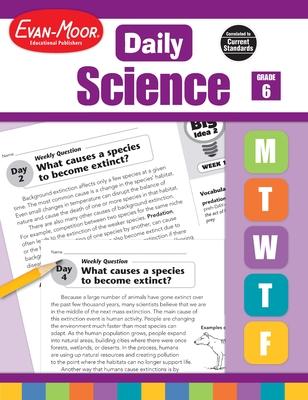Fit standards-based science instruction into your curriculum!
Help your grade 6 students develop a genuine understanding of standards-based scientific concepts and vocabulary using the 150 engaging activities in Daily Science! A variety of rich resources, including vocabulary practice, hands-on science activities, and comprehension tests in multiple-choice format, help you successfully introduce students to earth, life, and physical science concepts.
30 weeks of instruction cover the following standards-based science topics:
Big Idea 1: Living things are made mostly of cells. Multicellular organisms have different cells that perform specialized functionsWeek 1: Can horses and zebras have babies together?
Week 2: Why are some people left-handed?
Week 3: How can corn be yellow, white, or blue?
Week 4: Are identical twins exactly alike?
Week 5: Unit Review Big Idea 2: Changes in the environment can affect the survival of a species
Week 1: What causes a species to become extinct?
Week 2: How have crocodiles survived for millions of years?
Week 3: If the ice cap melts, why can't polar bears just adapt?
Week 4: Would humans survive if there was another ice age?
Week 5: Unit Review Big Idea 3: The tilt of Earth's axis and energy from the sun affect seasons and weather patterns
Week 1: What causes the weather?
Week 2: Why don't hurricanes happen at the equator?
Week 3: Why are the North and South Poles so cold?
Week 4: Are the seasons reversed on the other side of the world?
Week 5: Unit Review Big Idea 4: Earth is divided into layers: crust, mantle, and core. The crust is made up of plates and move slowly around the Earth's surface
Week 1: Why do the continents look like they fit together?
Week 2: How do scientists know what is inside Earth?
Week 3: What happens when two continents collide?
Week 4: What will Earth's surface look like in the future?
Week 5: Unit Review Big Idea 5: Matter is made up of tiny particles called atoms. Different arrangements of atoms compose all substances
Week 1: What do atoms look like?
Week 2: What is the periodic table?
Week 3: What is water made of?
Week 4: How are living things different from nonliving things?
Week 5: Unit Review Big Idea 6: Energy can be mechanical, electrical, thermal, or chemical
Week 1: How do windmills make electricity?
Week 2: What makes popcorn pop?
Week 3: What makes fireflies glow?
Week 4: How do fireworks work?
Week 5: Unit Review
This resource contains teacher support pages, reproducible student pages, and an answer key. This is a reproducible resource (photocopying of lessons is permitted) for single classroom or individual home use only.
About Evan-Moor
A leader in PreK-8 educational publishing, Evan-Moor has been a trusted partner of teachers and parents for over 40 years. Our mission is helping children learn, and we do this by creating resources that motivate children to learn important skills and concepts across the curriculum while also inspiring a love of learning.
